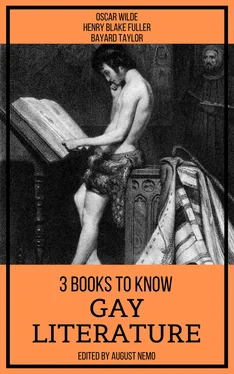“Days in summer, Basil, are apt to linger,” murmured Lord Henry. “Perhaps you will tire sooner than he will. It is a sad thing to think of, but there is no doubt that Genius lasts longer than Beauty. That accounts for the fact that we all take such pains to over-educate ourselves. In the wild struggle for existence, we want to have something that endures, and so we fill our minds with rubbish and facts, in the silly hope of keeping our place. The thoroughly well-informed man — that is the modern ideal. And the mind of the thoroughly well-informed man is a dreadful thing. It is like a bric-à-brac shop, all monsters and dust, with everything priced above its proper value. I think you will tire first, all the same. Some day you will look at your friend, and he will seem to you to be a little out of drawing, or you won’t like his tone of colour, or something. You will bitterly reproach him in your own heart, and seriously think that he has behaved very badly to you. The next time he calls, you will be perfectly cold and indifferent. It will be a great pity, for it will alter you. What you have told me is quite a romance, a romance of art one might call it, and the worst of having a romance of any kind is that it leaves one so unromantic.”
“Harry, don’t talk like that. As long as I live, the personality of Dorian Gray will dominate me. You can’t feel what I feel. You change too often.”
“Ah, my dear Basil, that is exactly why I can feel it. Those who are faithful know only the trivial side of love: it is the faithless who know love’s tragedies.” And Lord Henry struck a light on a dainty silver case, and began to smoke a cigarette with a self-conscious and satisfied air, as if he had summed up the world in a phrase. There was a rustle of chirruping sparrows in the green lacquer leaves of the ivy, and the blue cloud-shadows chased themselves across the grass like swallows. How pleasant it was in the garden! And how delightful other people’s emotions were! — much more delightful than their ideas, it seemed to him. One’s own soul, and the passions of one’s friends — those were the fascinating things in life. He pictured to himself with silent amusement the tedious luncheon that he had missed by staying so long with Basil Hallward. Had he gone to his aunt’s he would have been sure to have met Lord Goodbody there, and the whole conversation would have been about the feeding of the poor, and the necessity for model lodging-houses. Each class would have preached the importance of those virtues, for whose exercise there was no necessity in their own lives. The rich would have spoken on the value of thrift, and the idle grown eloquent over the dignity of labour. It was charming to have escaped all that! As he thought of his aunt, an idea seemed to strike him. He turned to Hallward, and said, “My dear fellow, I have just remembered.”
“Remembered what, Harry?”
“Where I heard the name of Dorian Gray.”
“Where was it?” asked Hallward, with a slight frown.
“Don’t look so angry, Basil. It was at my aunt, Lady Agatha’s . She told me she had discovered a wonderful young man, who was going to help her in the East End, and that his name was Dorian Gray. I am bound to state that she never told me he was good-looking. Women have no appreciation of good looks; at least, good women have not. She said that he was very earnest, and had a beautiful nature. I at once pictured to myself a creature with spectacles and lank hair, horribly freckled, and tramping about on huge feet. I wish I had known it was your friend.”
“I am very glad you didn’t, Harry.”
“Why?”
“I don’t want you to meet him.”
“You don’t want me to meet him?”
“No.”
“Mr. Dorian Gray is in the studio, sir,” said the butler, coming into the garden.
“You must introduce me now,” cried Lord Henry, laughing.
The painter turned to his servant, who stood blinking in the sunlight. “Ask Mr. Gray to wait, Parker: I shall be in in a few moments.” The man bowed, and went up the walk.
Then he looked at Lord Henry. “Dorian Gray is my dearest friend,” he said. “He has a simple and a beautiful nature. Your aunt was quite right in what she said of him. Don’t spoil him. Don’t try to influence him. Your influence would be bad. The world is wide, and has many marvellous people in it. Don’t take away from me the one person who gives to my art whatever charm it possesses; my life as an artist depends on him. Mind, Harry, I trust you.” He spoke very slowly, and the words seemed wrung out of him almost against his will.
“What nonsense you talk!” said Lord Henry, smiling, and, taking Hallward by the arm, he almost led him into the house.
––––––––

As they entered they saw Dorian Gray. He was seated at the piano, with his back to them, turning over the pages of a volume of Schumann’s “Forest Scenes.” “You must lend me these, Basil,” he cried. “I want to learn them. They are perfectly charming.”
“That entirely depends on how you sit to-day, Dorian.”
“Oh, I am tired of sitting, and I don’t want a life-sized portrait of myself,” answered the lad, swinging round on the music-stool, in a wilful, petulant manner. When he caught sight of Lord Henry, a faint blush coloured his cheeks for a moment, and he started up. “I beg your pardon, Basil, but I didn’t know you had anyone with you.”
“This is Lord Henry Wotton, Dorian, an old Oxford friend of mine. I have just been telling him what a capital sitter you were, and now you have spoiled everything.”
“You have not spoiled my pleasure in meeting you, Mr. Gray,” said Lord Henry, stepping forward and extending his hand. “My aunt has often spoken to me about you. You are one of her favourites, and, I am afraid, one of her victims also.”
“I am in Lady Agatha’s black books at present,” answered Dorian, with a funny look of penitence. “I promised to go to a club in Whitechapel with her last Tuesday, and I really forgot all about it. We were to have played a duet together — three duets, I believe. I don’t know what she will say to me. I am far too frightened to call.”
“Oh, I will make your peace with my aunt. She is quite devoted to you. And I don’t think it really matters about your not being there. The audience probably thought it was a duet. When Aunt Agatha sits down to the piano she makes quite enough noise for two people.”
“That is very horrid to her, and not very nice to me,” answered Dorian, laughing.
Lord Henry looked at him. Yes, he was certainly wonderfully handsome, with his finely-curved scarlet lips, his frank blue eyes, his crisp gold hair. There was something in his face that made one trust him at once. All the candour of youth was there, as well as all youth’s passionate purity. One felt that he had kept himself unspotted from the world. No wonder Basil Hallward worshipped him.
“You are too charming to go in for philanthropy, Mr. Gray — far too charming.” And Lord Henry flung himself down on the divan, and opened his cigarette-case.
The painter had been busy mixing his colours and getting his brushes ready. He was looking worried, and when he heard Lord Henry’s last remark he glanced at him, hesitated for a moment, and then said, “Harry, I want to finish this picture to-day. Would you think it awfully rude of me if I asked you to go away?”
Lord Henry smiled, and looked at Dorian Gray. “Am I to go, Mr. Gray?” he asked.
“Oh, please don’t, Lord Henry. I see that Basil is in one of his sulky moods; and I can’t bear him when he sulks. Besides, I want you to tell me why I should not go in for philanthropy.”
Читать дальше













